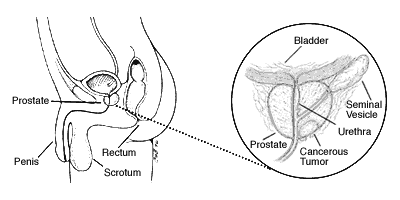 What is Prostate Cancer...? An Overview What is Prostate Cancer...? An Overview
What is prostate cancer? Prostate Cancer is a disease caused by the mutation of cells in the prostate that begin to multiply at increasing
rates.
Prostate Cancer can develop at any age; however it is more common in older men and risks increase drastically with advancing age. In some men,
the cancer can develop unnoticed and the men will die of other causes; though when caught early, prostate cancer has a 90% cure rate.
Therefore, it is crucial that every man see's his doctor for yearly prostate cancer screenings.

Prostate Cancer Signs and Symptoms
Men often do not know that they have prostate cancer until the later stages of the disease, unless they go in for regular screenings. This is
because prostate cancer, in the early stages, is asymptomatic (does not show symptoms). The first manifestations of the disease are often related
to bladder obstruction, and are similar to the signs and symptoms seen in patients with BPH (see p. 18). Rectal obstruction can also occur, which
causes problems with defecating during a bowel movement.
Later Stages of the disease often produce a wider variety of symptoms because at this point the cancer has often metastasized (spread) to
another area of the body such as the bones or lymph nodes. Signs and symptoms of the later stages of prostate cancer include:
Prostate Cancer Screening and Diagnosis
Screening and diagnosis is the same for both BPH and prostate cancer. Procedures include the following:
* Digital rectal examination (DRE): palpitation of the prostate gland via the anal canal may detect enlargement
* Prostate-specific antigen (PSA) blood tests: elevated levels of PSA in the blood may be an indication of cancer
* bone pain
* edema (swelling) of the lower extremities
* enlarged lymph nodes in the groin area, under the arms, or in the throat liver enlargement
* bone fractures
* mental confusion (seen in severe cases in which the cancer has spread to the brain)
* Transrectal ultrasonography (TRUS): ultrasound examination of the testicles, prostate, and kidneys may rule out other disease or confirm BPH
or cancer.
Prostate Cancer Treatment
Treatment of prostate cancer varies depending on the stage of cancer, the effects of treatment, age, general health, and life expectancy of
the individual. Men who are diagnosed and treated in the early stages of Prostate cancer have a 90% chance of being completely cured of the
disease.41 Although complete recovery is not as likely during the later stages of cancer, treatment can extend life expectancy, reduce tumor
size, and reduce pain. Treatment options include both surgical and non-surgical procedures.
Prostate Cancer Surgical Treatments
* Prostatectomy- the partial or complete removal of the prostate gland.
* Transurethral resection
* Cryotherapy- procedure in which the prostate gland is exposed to freezing temperatures. During the procedure, needles are inserted into the
prostate gland through the area between the scrotum and anus. Once the needles are in place the needles produce freezing temperatures which
destroy the prostate and all surrounding cancerous tissue. Note: Surgical treatment of prostate cancer can often result in a temporary loss of
urinary control and/or sexual dysfunction. Medications can be prescribed by your doctor to help reduce these side effects.
 Non-Surgical Prostate Cancer Treatments Non-Surgical Prostate Cancer Treatments
* Radiation therapy- medical use of ionizing radiation to destroy the DNA of cancerous cells. Radiation is used to destroy or
control the multiplication of malignant cells. Radiation is applied to the site of cancer (tumor, lymph nodes, etc.) and its surrounding tissue.
This treatment is often used in conjunction with Hormone or Chemotherapy.
* Hormone therapy- Hormone therapy involves the administration of specific hormones, such as steroids, or drugs which inhibit
the production or activity of other hormones involved in the development of the cancer. The agents used in hormone therapy are designed to alter
gene expression of the cancerous cells, causing cell activity to cease, or by promoting cell death.
* Chemotherapy- Chemotherapy is the use of chemicals and antibiotics to kill cancer cells. Cancer is caused by the
uncontrollable division of cells. The chemicals used during chemotherapy are designed to target rapidly-dividing cells, thus targeting the cancer
cells and not other healthy cells of the body.
* Immunotherapy- Immunotherapy is a relatively new treatment that stimulates the body's own immune-system to kill off
tumors.
| 
